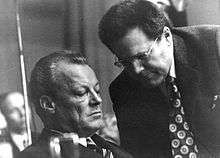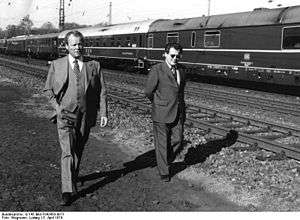Günter Guillaume
| Günter Guillaume | |
|---|---|
 Guillaume (right) with West German chancellor Willy Brandt, 1972–1974 | |
| Born |
February 1, 1927 Berlin, German Reich |
| Died |
April 10, 1995 (aged 68) Petershagen-Eggersdorf, Germany |
| Cause of death | Kidney cancer |
| Resting place |
Parkfriedhof Marzahn 52°32′55″N 13°32′29″E / 52.5485°N 13.5415°E |
| Residence | West Germany |
| Nationality | East Germany |
| Occupation | Intelligence agent; secretary of West German chancellor Willy Brandt |
| Years active | 1956–1974 |
| Organization | Stasi |
| Known for | Infiltration of West German government |
| Criminal charge | Treason[1] |
| Criminal penalty | 13 years in prison |
| Criminal status | Pardoned 1 October 1981[1] |
| Spouse(s) | Christel Guillaume |
| Children | Pierre Boom |

Günter Guillaume (1 February 1927 – 10 April 1995), was an intelligence agent for East Germany's secret service, the Stasi, in West Germany. Guillaume became West German chancellor Willy Brandt's secretary and caused his downfall.
Early life
Guillaume was born in Berlin. He was conscripted as a Flakhelfer in 1944 and later joined the Nazi Party.[2]
Career
In 1956, he and his wife Christel emigrated to West Germany on Stasi orders to penetrate and spy on West Germany's political system. Rising through the hierarchy of the Social Democratic Party of Germany, he became a close aide to West German chancellor Willy Brandt.
In 1974, West German authorities discovered Guillaume's spying for the East German government. The resulting scandal, the Guillaume Affair, led to Brandt's resigning the chancellorship. On 15 December 1975, Guillaume was sentenced to 13 years in prison for treason; his wife, to eight years.[1] In 1981, Guillaume was returned to East Germany in exchange for Western spies caught by the Eastern Bloc.
In East Germany, Guillaume was received and celebrated as a hero, worked as a spy trainer, and published his autobiography Die Aussage ("The Statement")[3] in 1988. Two years before he married his second wife nurse Elke Bröhl. Guillaume and East German spymaster Markus Wolf have said that Willy Brandt's downfall was not intended, and that the affair is among the Stasi's biggest mistakes. After Die Wende and German reunification, the reunified Germany granted Guillaume immunity from any further prosecutions. He was a supportive witness in Wolf's trial for treason in 1993.[4]
Death
Guillaume died of kidney cancer on 10 April 1995, in Petershagen/Eggersdorf, near Berlin. Guillaume's first wife died 20.3.2004.
In culture
The Brandt-Guillaume story is told in the play Democracy by Michael Frayn. It follows Brandt's political career as West Germany's first left-of-centre chancellor in 40 years, and his fall because of his assistant. It portrays Guillaume as in conflict by spying on Brandt while growing to admire him.
References
- 1 2 3 "Guillaume: Wer war der Schurke?" [Guillaume: Who was that scoundrel?]. Der Spiegel (in German). Hamburg. 26 December 1988. pp. 14–21. Retrieved 2016-06-21.
- ↑ Adams, Jefferson (2014). Strategic Intelligence in the Cold War and Beyond. Routledge. p. 58. ISBN 9781317637684.
- ↑ Die Aussage means The Statement, or My Stated View: Oxford Duden German Dictionary ISBN 0-19-864171-0)
- ↑ Craig R. Whitney (1995-04-12). "Gunter Guillaume, 68, Is Dead; Spy Caused Willy Brandt's Fall". The New York Times. Retrieved 2009-05-20.
External links
- "Willy Brandt Biography: May 1974: Günter Guillaume". Federal Chancellor Willy Brandt Foundation. Retrieved 2009-05-20.